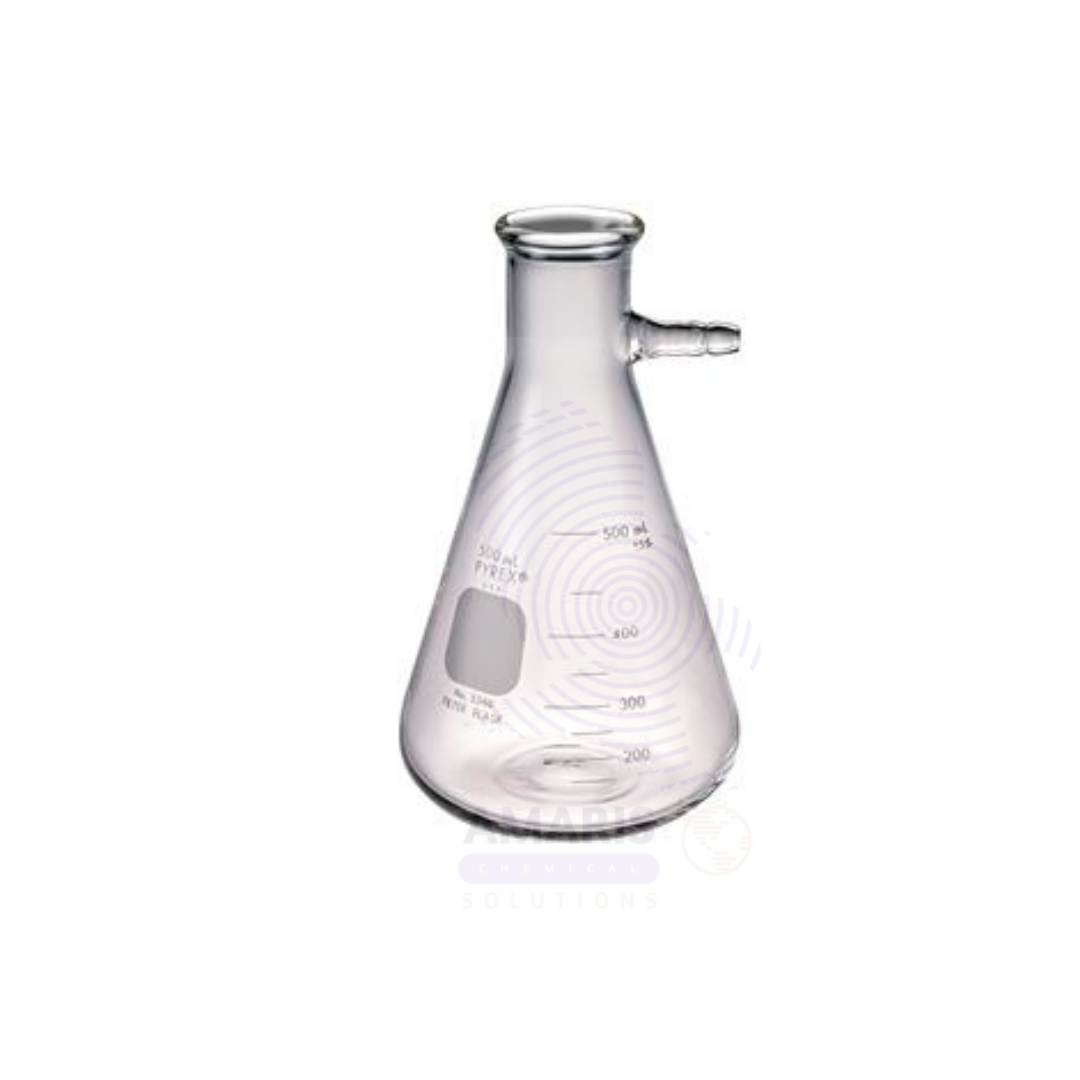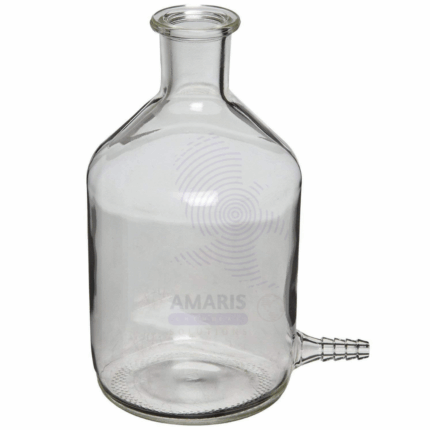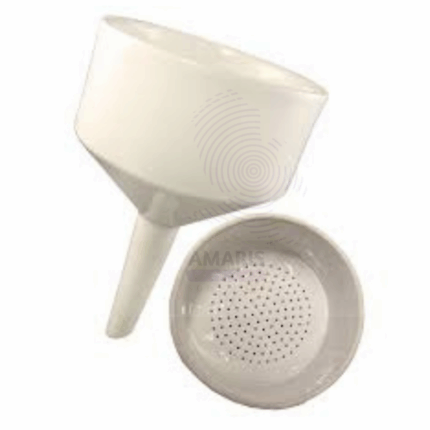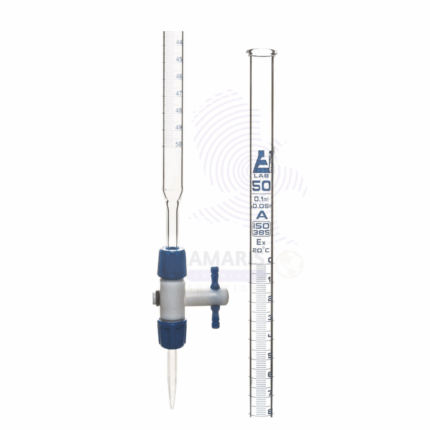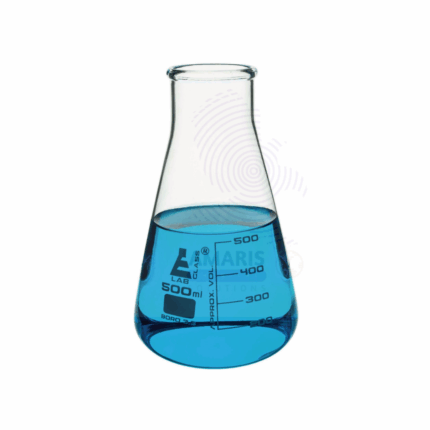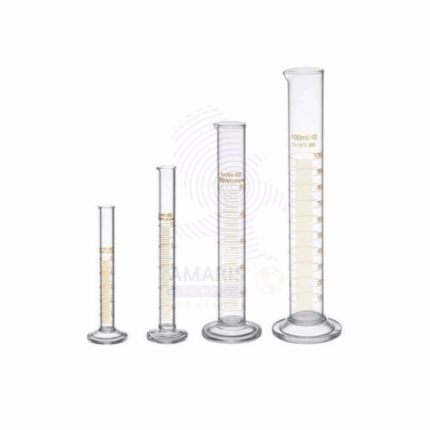“Gas Jar Lid” has been added to your cart. View cart

Model steam engine
$ 93.17 Original price was: $ 93.17.$ 93.04Current price is: $ 93.04.
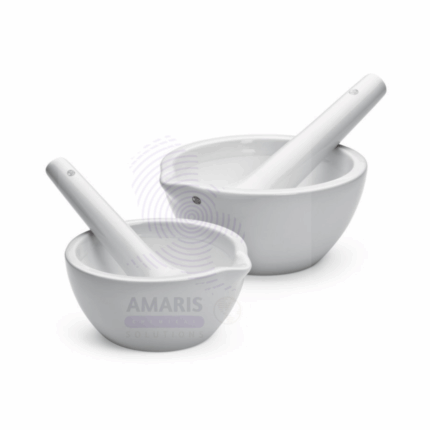
Mortar and pestle
$ 11.78 Original price was: $ 11.78.$ 11.62Current price is: $ 11.62.
Filter Flask
$ 14.02 Original price was: $ 14.02.$ 13.93Current price is: $ 13.93.
Whatsapp Order
Filter Flask is a specially designed laboratory glass vessel, typically made from chemically resistant borosilicate glass, featuring a thick-walled body and a side arm for connection to vacuum sources. It is used in vacuum filtration procedures to collect filtrates efficiently while providing durability and chemical resistance. The side arm allows attachment to vacuum pumps or aspirators to create suction, speeding up the filtration process. Filter flasks are essential in chemical, biological, and pharmaceutical labs for separating solids from liquids, clarifying solutions, and sample preparation.
Description
Table of Contents
Toggle
Filter Flask
Primary Use
- Laboratory and Medical Applications
- Used in vacuum filtration setups to collect filtered liquids and residues.
- Suitable for use with laboratory vacuum pumps and aspirators.
- Applied in microbiology and chemical laboratories for sample clarification and preparation.
- Facilitates rapid filtration of reaction mixtures and culture media.
Secondary Uses
- Industrial and Research Laboratories
- Used for separating solid impurities from liquid products in chemical processing.
- Employed in pharmaceutical industries for purification of raw materials.
- Used in environmental laboratories for water and wastewater analysis.
- Applied in research for sample concentration and isolation.
KEY PRODUCT FEATURES
1.Basic Identification Attributes
- Material: Chemically resistant borosilicate glass
- Design: Thick-walled with a side arm for vacuum connection
- Sizes: Available in various volumes to suit laboratory needs
2.Physical & Chemical Properties
- Chemical Resistance: Resistant to acids, alkalis, and solvents
- Thermal Resistance: Can withstand autoclaving and temperature fluctuations
- Transparency: Clear glass for easy monitoring of contents
3.Safety & Hazard Attributes
- Fragile glass material requiring careful handling to avoid breakage
- Side arm connection must be secure to prevent vacuum leaks
4.Storage & Handling Attributes
- Store in padded, stable environments to prevent damage
- Clean thoroughly after use to avoid contamination
- Inspect regularly for cracks or damage before vacuum use
5.Regulatory & Compliance Attributes
- Manufactured according to laboratory glassware standards (ISO, ASTM)
- Suitable for GMP and GLP compliant laboratories
6.Environmental & Health Impact
- Glass is recyclable and environmentally sustainable
- Proper disposal of chemical residues recommended
SAFETY HANDLING PRECAUTIONS
Safety Handling Precautions
- Use PPE such as gloves and safety goggles during handling
- Avoid sudden temperature changes to prevent glass breakage
First Aid Measures
- For cuts from broken glass, clean wounds and seek medical attention if necessary
- Follow chemical safety protocols if chemical exposure occurs
Firefighting Measures
- Non-flammable glass material
- Use extinguishing agents suitable for surrounding combustibles
Related products
Aspirator Bottle Glass
Aspirator Bottle Glass is a durable, high-quality glass container designed specifically for use in laboratory suction and aspiration systems. These bottles are engineered to safely collect and contain liquids and aerosols during filtration, vacuum, or aspiration procedures. Made from chemically resistant glass, Aspirator Bottles offer excellent clarity and durability while withstanding the rigors of laboratory use. They typically feature secure screw caps or stopper closures that ensure leak-proof performance and easy handling. Widely used in medical, research, and industrial laboratories, Aspirator Bottle Glass is essential for safe fluid management in various applications.
Buchner Funnel
The Buchner Funnel is a laboratory filtration device used for vacuum filtration processes. It typically consists of a flat, perforated plate covered with a filter paper, housed in a cylindrical funnel. Made from porcelain, glass, or plastic, the Buchner Funnel allows for rapid filtration by applying vacuum suction, which speeds up the separation of solids from liquids. It is widely used in chemical, biological, and pharmaceutical laboratories for efficient solid-liquid separation during sample preparation, purification, and analysis.
Burette PTFE
The Burette PTFE is a high-quality laboratory burette constructed with a polytetrafluoroethylene (PTFE) stopcock and nozzle, providing excellent chemical resistance and durability. Known for its non-reactive and non-stick properties, PTFE ensures smooth and precise flow control during titration and other volumetric analyses. This burette is ideal for handling corrosive and aggressive chemicals, maintaining accuracy and reliability in laboratory measurements.
conical flask
Conical flasks, also known as Erlenmeyer flasks, are widely used laboratory glassware characterized by a flat bottom, conical body, and a narrow neck. Made typically from borosilicate glass, they are designed to hold, mix, and heat liquids safely. The narrow neck helps reduce evaporation and splashing during experiments. Conical flasks are essential for titrations, culturing microorganisms, and general solution preparation in laboratories and industrial settings.
Expansion of Liquid Apparatus
Expansion of Liquid Apparatus is a laboratory device designed to measure the volumetric expansion of liquids when subjected to temperature changes. It consists of a graduated glass tube connected to a bulb containing the test liquid. As the liquid heats and expands, the change in volume is observed and recorded through the graduated scale. This apparatus is essential in physical chemistry and materials science for studying thermal expansion coefficients and understanding liquid behavior under varying thermal conditions. It is commonly made from chemically resistant borosilicate glass to withstand thermal stress and chemical exposure.
measuring cylinder glass
The Measuring Cylinder Glass is a fundamental laboratory apparatus specifically engineered for the precise measurement of liquid volumes. Constructed from high-quality, chemically resistant borosilicate glass, it ensures durability, resistance to chemical corrosion, and clarity for optimal visibility of liquid levels. The cylindrical shape provides a stable base and ergonomic design for ease of handling and pouring. Graduated volume markings, typically etched or printed with high contrast, allow accurate reading of liquid quantities down to the milliliter, supporting quantitative experiments and solution preparations. The transparent nature of the glass facilitates observation of the meniscus, which is critical for accuracy in volume measurement. Measuring cylinders vary in size, commonly ranging from small (10 mL) to large capacities (1000 mL or more), meeting diverse laboratory needs. They are widely used across chemical, biological, medical, educational, and industrial laboratories for tasks including volumetric analysis, solution preparation, and quality control. Their ability to withstand thermal fluctuations and autoclaving processes also makes them suitable for sterilized environments. Measuring Cylinder Glass is essential for maintaining precision and reproducibility in experimental and routine laboratory procedures.
medium binder
Medium Binder is a versatile adhesive or binding agent used primarily in laboratory and research settings to hold together particles, fibers, or layers to form cohesive solids or composites. It is formulated from polymers, resins, or other chemical compounds tailored for lab applications such as sample preparation, material testing, and fabrication of experimental materials. Medium Binder provides reliable adhesion and stability, ensuring consistent results in scientific experiments and materials research. Its chemical properties can be adjusted for resistance to heat, moisture, and solvents, making it suitable for various experimental conditions.
Mortar and pestle
Mortar and Pestle is a traditional laboratory apparatus consisting of a bowl (mortar) and a heavy club-shaped tool (pestle) used to manually grind, crush, and mix solid substances into fine powders or pastes. Made from durable materials such as ceramic, glass, porcelain, or stone, this tool facilitates the preparation of samples for chemical analysis, pharmaceutical compounding, and food laboratory testing. The mortar’s thick walls and the pestle’s sturdy design allow effective pulverization without contamination. Mortar and pestle sets are essential in laboratories for homogenizing powders, breaking down crystals, and preparing reagents and mixtures. Their simplicity and reliability make them a staple in chemistry, biology, pharmacology, and food science labs worldwide.


 Preservatives(food)
Preservatives(food) Flavor Enhancers
Flavor Enhancers Acidulants
Acidulants Sweeteners
Sweeteners Antioxidants
Antioxidants Colorants(food)
Colorants(food) Nutraceutical Ingredients (food)
Nutraceutical Ingredients (food) Nutrient Supplements
Nutrient Supplements Emulsifiers
Emulsifiers
 Collectors
Collectors Dust Suppressants
Dust Suppressants Explosives and Blasting Agents
Explosives and Blasting Agents Flocculants and Coagulants
Flocculants and Coagulants Frothers
Frothers Leaching Agents
Leaching Agents pH Modifiers
pH Modifiers Precious Metal Extraction Agents
Precious Metal Extraction Agents
 Antioxidants(plastic)
Antioxidants(plastic) Colorants (Pigments, Dyes)
Colorants (Pigments, Dyes) Fillers and Reinforcements
Fillers and Reinforcements Flame Retardants
Flame Retardants Monomers
Monomers Plasticizers
Plasticizers Polymerization Initiators
Polymerization Initiators Stabilizers (UV, Heat)
Stabilizers (UV, Heat)
 Antifoaming Agents
Antifoaming Agents Chelating Agents
Chelating Agents Coagulants and Flocculants
Coagulants and Flocculants Corrosion Inhibitors
Corrosion Inhibitors Disinfectants and Biocides
Disinfectants and Biocides Oxidizing Agents
Oxidizing Agents pH Adjusters
pH Adjusters Scale Inhibitors( water)
Scale Inhibitors( water)
 Antioxidants(cosmetic)
Antioxidants(cosmetic) Emollients
Emollients Fragrances and Essential Oils
Fragrances and Essential Oils Humectants
Humectants Preservatives
Preservatives Surfactants(cosmetic)
Surfactants(cosmetic) Thickeners
Thickeners UV Filters
UV Filters
 Fertilizers
Fertilizers Soil Conditioners
Soil Conditioners Plant Growth Regulators
Plant Growth Regulators Animal Feed Additives
Animal Feed Additives Biostimulants
Biostimulants Pesticides (Herbicides, Insecticides, Fungicides)
Pesticides (Herbicides, Insecticides, Fungicides)
 Active Pharmaceutical Ingredients (APIs)
Active Pharmaceutical Ingredients (APIs) Excipients
Excipients Solvents(pharmaceutical)
Solvents(pharmaceutical) Antibiotics
Antibiotics Antiseptics and Disinfectants
Antiseptics and Disinfectants Vaccine Adjuvants
Vaccine Adjuvants Nutraceutical Ingredients (pharmaceutical)
Nutraceutical Ingredients (pharmaceutical) Analgesics & Antipyretics
Analgesics & Antipyretics
 Analytical Reagents
Analytical Reagents Solvents(lab)
Solvents(lab) Chromatography Chemicals
Chromatography Chemicals Spectroscopy Reagents
Spectroscopy Reagents microbiology-and-cell-culture-reagents
microbiology-and-cell-culture-reagents Molecular Biology Reagents
Molecular Biology Reagents Biochemical Reagents
Biochemical Reagents Inorganic and Organic Standards
Inorganic and Organic Standards Laboratory Safety Chemicals
Laboratory Safety Chemicals Specialty Laboratory Chemicals(Special Laboratory Equipment)
Specialty Laboratory Chemicals(Special Laboratory Equipment)
 Demulsifiers
Demulsifiers Hydraulic Fracturing Fluids
Hydraulic Fracturing Fluids Scale Inhibitors(oil)
Scale Inhibitors(oil) Surfactants(oil)
Surfactants(oil) Drilling Fluids
Drilling Fluids
 Dyes and Pigments
Dyes and Pigments Bleaching Agents
Bleaching Agents Softening Agents
Softening Agents Finishing Agents
Finishing Agents Antistatic Agents
Antistatic Agents
 Admixtures
Admixtures Waterproofing Agents
Waterproofing Agents Sealants and Adhesives
Sealants and Adhesives Curing Compounds
Curing Compounds Concrete Repair Chemicals
Concrete Repair Chemicals Anti-Corrosion Coatings
Anti-Corrosion Coatings
 Surfactants(cleaning)
Surfactants(cleaning) Builders
Builders Enzymes
Enzymes Solvents (Cleaning)
Solvents (Cleaning) Fragrances
Fragrances
 Electronic Chemicals
Electronic Chemicals Catalysts
Catalysts Lubricants
Lubricants Photographic Chemicals
Photographic Chemicals Refrigerants
Refrigerants Automotive chemicals
Automotive chemicals Pyrotechnic Chemicals
Pyrotechnic Chemicals
 Biodegradable Surfactants
Biodegradable Surfactants Bio-based Solvents
Bio-based Solvents Renewable Polymers
Renewable Polymers Carbon Capture Chemicals
Carbon Capture Chemicals Wastewater Treatment Chemicals
Wastewater Treatment Chemicals
 Pigments
Pigments Solvents(paint)
Solvents(paint) Specialty Coatings
Specialty Coatings Binders/Resins
Binders/Resins Additives
Additives Driers
Driers Anti-Corrosion Agents
Anti-Corrosion Agents Functional Coatings
Functional Coatings Application-Specific Coatings
Application-Specific Coatings
 Fresh Herbs
Fresh Herbs Ground Spices
Ground Spices Whole Spices
Whole Spices Spice Blends
Spice Blends Dried Herbs
Dried Herbs
 Leavening Agents
Leavening Agents Dough Conditioners
Dough Conditioners Flour Treatments
Flour Treatments Fat Replacers
Fat Replacers Decoratives
Decoratives Preservatives(baking)
Preservatives(baking)
 Plasticizers & Softeners
Plasticizers & Softeners Reinforcing Agents
Reinforcing Agents Adhesion Promoters
Adhesion Promoters Vulcanizing Agents
Vulcanizing Agents Antidegradants
Antidegradants Blowing Agents
Blowing Agents Fillers & Extenders
Fillers & Extenders Accelerators & Retarders
Accelerators & Retarders